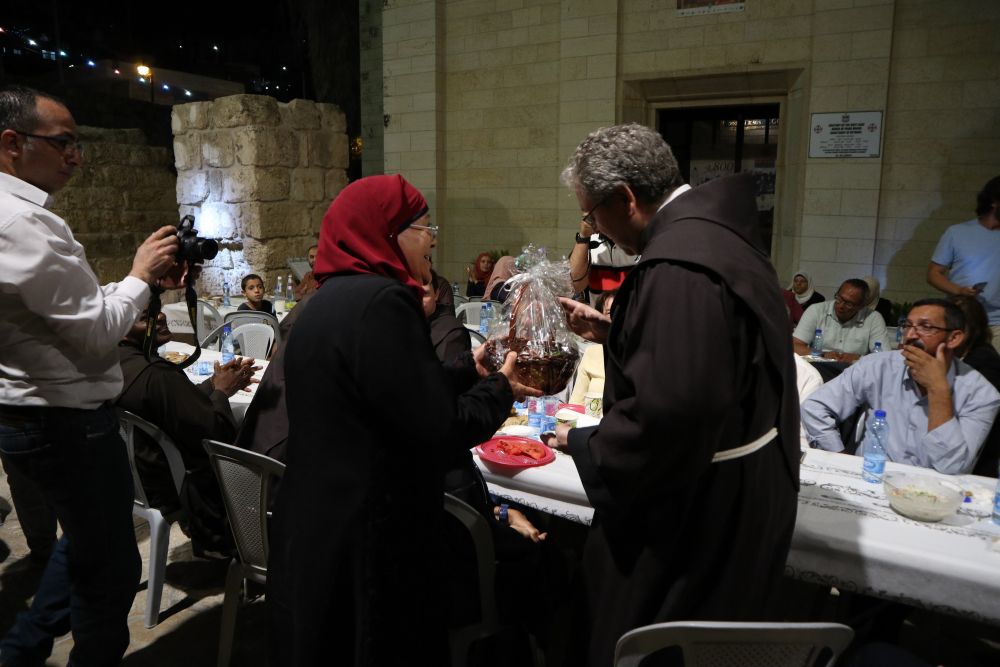
Bethany. At the Franciscan monastery, an Iftar of “hospitality, friendship and brotherhood”
The tables occupy the churchyard of Bethany, the city a few miles from Jerusalem where Lazarus, Martha and Mary lived. Everything is ready to begin, for the second consecutive year at the Iftar, the dinner that interrupts the daily fast that Muslims perform during the month of Ramadan, to which, for the occasion, the Franciscans also participate together with the local Islamic community. of the Custody of the Holy Land.
In the Islamic calendar, Ramadan has just ended. This is the ninth month of the year, during the whole period fasting is held in commemoration of the month in which the Koran was revealed. This annual event is considered one of the Five Pillars of Islam, that is one of the five religious precepts that a good Muslim must respect. Fasting is a mandatory practice for adult Muslims, except for children, the sick and pregnant women. During fasting from sunrise to sunset, Muslims abstain from eating food and drink and from vices. Food and drinks are served daily before dawn and after sunset in meals called suḥūr and ifṭār, respectively.
Shortly before sunset the guests begin to arrive and to sit down, from the minaret illuminated by green (the color of Islam) of the adjacent mosque the voice of the muezzin in prayer is heard thundering: here is the explosion of the cannon of the Iftar: the Muslims they begin by drinking almond milk in small sips and eating dates to calm the stomach after fasting, Christians make the sign of the cross, all together you can start dinner.
In his many journeys to the Holy City, Jesus spent some significant moments in Bethany as a guest of his friend Lazarus and his sisters, in the welcome speech the Custos of the Holy Land Father Francis Patton recalls how the welcoming and fraternal spirit of the Gospel story on Bethany is today an inspiration in interreligious dialogue with the local majority Muslim community: “” Bethany is the house of friendship “said Br. Patton” for this is important this initiative of Iftar in which we, together, Christians and Muslims, we share the meal. It is a sign of the commitment of the communities to remain a place of hospitality, friendship and brotherhood “.
The Custos cites the document signed by Pope Francis and the great Imam which establishes a pact of brotherhood between Christians and Muslims of particular relevance in the year in which the Franciscans celebrate the eight hundredth anniversary of the Meeting between St. Francis and the Sultan: “A thanks to ATS pro Terra Sancta, Osama Hamdan and the Mosaic Center for building bridges and not walls between our communities with the same purpose of living as one family ”.
The IFTAR initiative in fact started from an idea of the Mosaic Center and ATS pro Terra Sancta that in Betania, with the funds of the Italian Agency for Cooperation (AICS) carry out a restoration project, recovery of the sanctuary promoting tourism and the arrival of pilgrims. A work appreciated by the whole community “Bethania’s economy is connected to tourism, we do our best to improve our relations with Christians, who are the majority of tourists here”, said Dr. Musa Khatib, the deputy mayor of the city, “It is the second time that we meet again for this event and we hope to do it every year because it is a sign of unity between Muslims and Christians”.
Even Cristina Natoli, head of the Jerusalem office of the Italian Agency for Cooperation and Development, said she was proud to finance ATS pro Terra Sancta and the Mosaic Center in a project that not only recovers the local artistic heritage, but also to support the community that lives around it by creating opportunities for work and income that strengthen the ties between the Christian and Muslim reality.
Osama Hamdan, architect in charge of the works, reiterates that “Making Iftar inside the convent is a good opportunity to bring people together and get to know each other better. It is the fear of the other that creates problems, when you have a direct experience of people you overcome all the problems and you understand that we are all the same, each with his religion “.
As proof of how these initiatives bear fruit in relations between the communities, Osama adds: “After the end of Ramadan, we reached an agreement with the local Imam to begin restoration work on the crusade part of the mosque. We want to help preserve a heritage that is part of Palestinian history, even if it is not an Islamic period and we are talking to be able to open part of the excavations under the mosque to the public “.